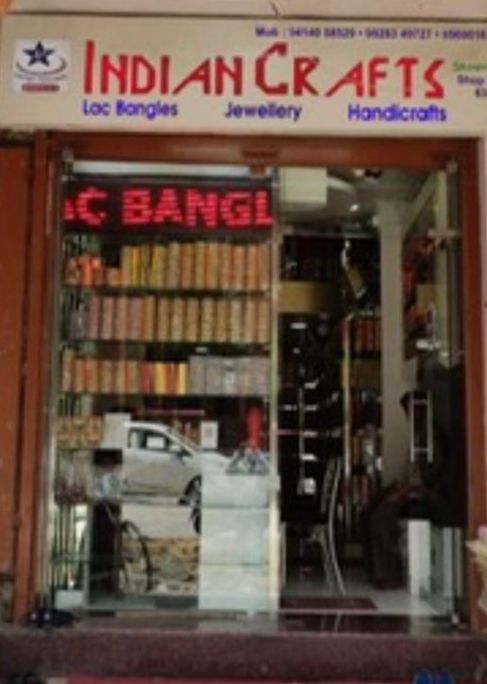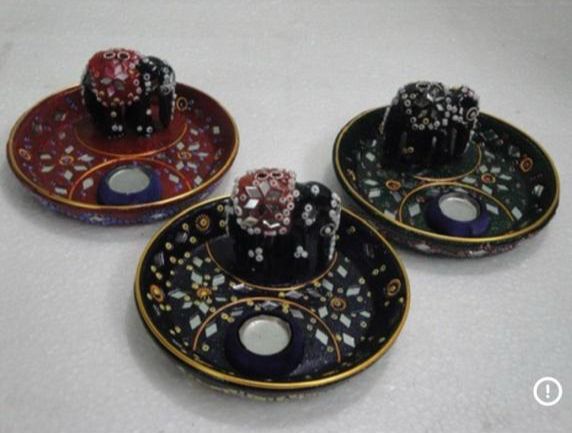
Farhan Israeli/Jaipur
Abdul Salam Johar has blended tradition with innovation to take Manihar community to a new height of respect in Rajasthan.
He doesn’t just create lacquered bangles, but a unique example for hope, change, and light to endure.
His journey teaches us that the alignment of passion, hard work and societal consciousness can be the foundation of any change.
Along the perfumed streets of Jaipur where traditional handicrafts is the soul of the city, Abdul Salam is doing business under challenging circumstances, yet not without social concern.

Abdul Salam Johar receiving an award
His products on one hand, are a symbol of traditional beauty and on the other hand, the fruit of the labour of thousands of hands.
Born into the Manihar community, Johar was belongs to a simple family but he had big dreams. His grandfather Hafiz Mohammad Ismail was the first Hafiz of the community, who laid a foundation of business and religion in the family.
Seeing his father Haji Abdul Aziz and mother Hajjan Qamar Jahan’s struggles, Johar made hard work, dedication and social service the main mantra of his life.
The journey that beganin his ancestral shop 'Indian Kangan and Colour Store' located in Tripolia Bazaar of Jaipur has now reached brands like 'Johar Design', 'Johar King' and 'Indian Crafts' in global markets.

He has had clients in the United States, Italy, France, Germany, Dubai and other Arab nations. Many a times, customers waited for long durations due to high demand and limited production.
Remarkably he didn’t reduce his lacquer bangles to just business or employment, and instead made it a means of innovation and social good.
He foresaw that making bangles would not take him forward and so, he combined a lot of his handicraft including lacquer, brass, wood, blue pottery and handmade paper.
This initiative infused a new vibrance in the market and gave his rich products a special place in the world of décor and fashion.
For Christmas decorations, products like Christmas balls, Santa Claus, Jewellery boxes, candle stands, photo frames, pen stands, bouquets, and wooden animals were quite in demand in the international markets.
Johar understood that this success would last only if the artisans behind it were respected, secure and paid fairly.
Incidents of artisans getting burnt while working with hot lac were common, but he trained them, motivated them and gave them better wages. Due to his efforts, this tradition reached the villages of Sikar, Jhunjhunu, Fatehpur and Shekhawati and became a source of livelihood for thousands of families.
Till the 2000s, the business of lac was at its peak until the global market was flooded with cheap and durable products from China, Taiwan and Thailand.
The foreign products certainly looked like lac, but they had neither the soul of tradition nor the blood and sweat of the artisans. Despite this, the Indian market leaned towards these artificial chemical products.
Rising raw material prices and international competition left entrepreneurs like Johar struggling. There was no or little support from the government.
The prices of raw materials such as lac, coal, glass and glitter powder kept rising, but no government scheme could help the craftsmen. As a result, many artisans left the profession and started small shops or became wage-labourers.
Despite these challenges, Abdul Salam Johar never let his resolve for social service weaken. From his school and college days, he raised his voice against the prevalent evils within the Manihar community.
As the secretary of the community, he campaigned against death feasts, the unnecessary dowry system and other ostentatious customs for ten to twelve years. He made people see that freedom from these evils is real progress.
Due to his efforts, many of these traditions changed, the thinking of the society changed and the new generation got a new direction. He understood very well that the progress of a community cannotjust be only economic but also social.

Abdul Salam Johar receiving an award
His hard work and innovation were appreciated at home and abroad. He was honoured with prestigious awards like Bharat Gaurav Award, Indira Gandhi Award, International Kohinoor Award, Samaj Ratna and Gandhi Peace Award. These awards were given in India, Nepal and Bangkok, which is a proof of his global recognition.
But unfortunately, he regrets he did not receive any support from the Rajasthan government. He gave many suggestions to save a unique tradition like lac, but to no avail.
Lacquer work is completely handmade and machines have no role in it. Therefore, he believes the government should provide facilities like cheap loans with lower interests, discounts on raw materials, training centres, and market accessibility to the artisans.
He along with other artisans would welcome the setting up of a dedicated handicrafts board as a permanent solution where artisans have the space, resources and market at one place.

A masterpiece by Abdul Salam Johari
If immediate steps are not taken, this traditional art will slowly die and the future of thousands of families will take a bleak turn.
Johar believes that the art of lacquer is not just a business but the cultural soul of Rajasthan. It is the responsibility of the entire society and not just the government to save it. For him, this work is not just a means of profit but also a means of service and respect for art and tradition.
ALSO READ: India is the only stable country in South Asia
He does not consider this journey of his life as a personal one, but the story of collective struggle and upliftment. His dream is that the coming generation will take this art forward with pride and re-establish it at the global level.
